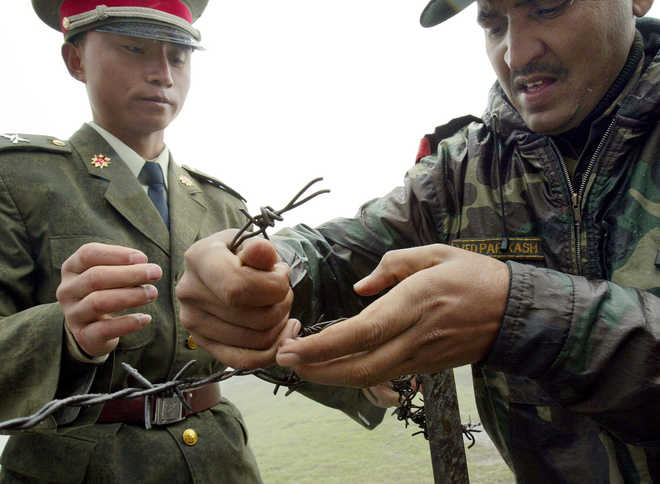
chinese checkers: China has settled 12 of its 14 land disputes, at times granting territorial concessions for political guarantees. Post-Tiananmen, when China settled the second batch of disputes, it overlooked India for non-democratic socialist neighbours for whom human rights was a lesser consideration photo: AFP
Sandeep Dikshit
China’s attitude towards resolving its border disputes is one of the most complicated subjects in foreign affairs of this region. But one aspect has come to the fore: of the 12 land disputes it has settled so far, China’s own domestic compulsions have been the overriding factor. Beijing has conveniently junked its ancient claims to grasslands and peaks; rivers and mountain slopes whenever its national interests dictated that it must move quickly to mend fences with its neighbours.
It made no difference whether the disputes dated back to centuries or were born because of colonial occupation. If the border had to be settled, so be it. As this clear-eyed take at China’s 14 land disputes informs, six border disagreements were resolved in the first batch (early 1960s) and six in the 1990s. Only two remain: with India and Bhutan.
China exercised all tools at its command: opportunism, military power, plain lucre and even blackmail. But the main drivers were regional and global compulsions; never good will or charity: Xinxiang unrest (Afghanistan and Pakistan), tensions with India (Myanmar and Nepal) and differences with the USSR (North Korea and Mongolia). In some cases, Beijing took the first step and offered highly favourable boundary agreements, including territories claimed inside China.
Why didn’t China settle with Indian in the first batch? Was it because of the Tibetan uprising and Nehru giving sanctuary to the Dalai Lama in a CIA brokered deal?
The second batch took place in the 1990s. The domestic compulsions were again so overpowering that many countries got away with territorial concessions if they reciprocated with political concessions. First off the mark was Kazakhstan. Interestingly, the main Chinese diplomat at these talks, Dai Binguuo, was later Beijing’s pointsman for Sino-India talks. Many of the Uighurs of China’s restive Xinxiang had ethnic links across the border in Kazakhstan. Its promise not to interfere in China’s internal affairs was rewarded with a 50-million yuan credit line. But it didn’t work out happily for the President of Kyrgyzstan, who had to abdicate, following rumours the Chinese had bribed and blackmailed him into an agreement.
The agreement with Tajikistan took time and much like its stance with India, China was reluctant to compromise on the Pamir Mountains. But in the end China took just 3.5 per cent of 28,000 square km of Pamir Mountains it had claimed. More interestingly, the lead Chinese negotiator for the border talks, Yang Jeichi, now heads the Sino-India border talks.
China was overeager to settle with Moscow even when it was the Soviet capital. Boris Yeltson offered a major political concession by derecognising Taiwan (affirming the One China Policy). But Russia’s close ties with India and its relative reluctance to transfer some high-end military technology to China meant that some aspects of the border agreement lingered on till 2008.
This leads us to the question about India’s absence from the second batch as well. The main reason might have been that post-Tiananmen, a diplomatically isolated China found it more convenient to cosy up with non-democratic socialist neighbours for whom the hue and cry over trampling of human rights in China was a lesser consideration than India with a substantial pro-western intelligentsia to boot.
That leaves just Bhutan and India with outstanding land border disputes with China. The state of play is tantalising even for a crystal ball gazer. Will there be a war with India? There is no definitive answer but China’s last military clash was nearly 30 years back. The book makes the point that China’s priorities have shifted. Once it was reunification of Taiwan. Today, it is settling the dispute in South China Sea in its favour. Earlier its focus was on land borders, today it is to claim the resource rich maritime waters. Now that China is focused more on economic resources in South China Sea, will it feel sufficiently encouraged to move forward on a border pact with India? As Sana Hashmi firmly establishes, historical claims are not really sacrosanct.



























